5 books about Coe, Cati
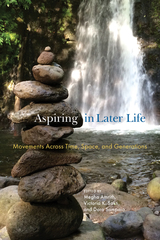
Aspiring in Later Life
Movements across Time, Space, and Generations
Megha Amrith
Rutgers University Press, 2023
In our highly interconnected and globalized world, people often pursue their aspirations in multiple places. Yet in public and scholarly debates, aspirations are often seen as the realm of younger, mobile generations, since they are assumed to hold the greatest potential for shaping the future. This volume flips this perspective on its head by exploring how aspirations are constructed from the vantage point of later life, and shows how they are pursued across time, space, and generations. The aspirations of older people are diverse, and relate not only to aging itself but also to planning the next generation’s future, preparing an "ideal" retirement, searching for intimacy and self-realization, and confronting death and afterlives. Aspiring in Later Life brings together rich ethnographic cases from different regions of the world, offering original insights into how aspirations shift over the course of life and how they are pursued in contexts of translocal mobility.
This book is also freely available online as an open-access digital edition.
Download the open access book here.
This book is also freely available online as an open-access digital edition.
Download the open access book here.
[more]
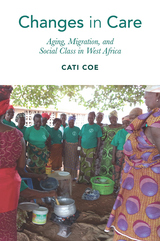
Changes in Care
Aging, Migration, and Social Class in West Africa
Cati Coe
Rutgers University Press, 2022
Africa is known both for having a primarily youthful population and for its elders being held in high esteem. However, this situation is changing: people in Africa are living longer, some for many years with chronic, disabling illnesses. In Ghana, many older people, rather than experiencing a sense of security that they will be respected and cared for by the younger generations, feel anxious that they will be abandoned and neglected by their kin. In response to their concerns about care, they and their kin are exploring new kinds of support for aging adults, from paid caregivers to social groups and senior day centers. These innovations in care are happening in fits and starts, in episodic and scattered ways, visible in certain circles more than others. By examining emergent discourses and practices of aging in Ghana, Changes in Care makes an innovative argument about the uneven and fragile processes by which some social change occurs.
There is a short film that accompanies the book, “Making Happiness: Older People Organize Themselves” (2020), an 11-minute film by Cati Coe. Available at: https://doi.org/doi:10.7282/t3-thke-hp15
There is a short film that accompanies the book, “Making Happiness: Older People Organize Themselves” (2020), an 11-minute film by Cati Coe. Available at: https://doi.org/doi:10.7282/t3-thke-hp15
[more]
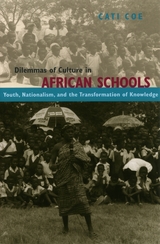
Dilemmas of Culture in African Schools
Youth, Nationalism, and the Transformation of Knowledge
Cati Coe
University of Chicago Press, 2005
In working to build a sense of nationhood, Ghana has focused on many social engineering projects, the most meaningful and fascinating of which has been the state's effort to create a national culture through its schools. As Cati Coe reveals in Dilemmas of Culture in African Schools, this effort has created an unusual paradox: while Ghana encourages its educators to teach about local cultural traditions, those traditions are transformed as they are taught in school classrooms. The state version of culture now taught by educators has become objectified and nationalized—vastly different from local traditions.
Coe identifies the state's limitations in teaching cultural knowledge and discusses how Ghanaians negotiate the tensions raised by the competing visions of modernity that nationalism and Christianity have created. She reveals how cultural curricula affect authority relations in local social organizations—between teachers and students, between Christians and national elite, and between children and elders—and raises several questions about educational processes, state-society relations, the production of knowledge, and the making of Ghana's citizenry.
Coe identifies the state's limitations in teaching cultural knowledge and discusses how Ghanaians negotiate the tensions raised by the competing visions of modernity that nationalism and Christianity have created. She reveals how cultural curricula affect authority relations in local social organizations—between teachers and students, between Christians and national elite, and between children and elders—and raises several questions about educational processes, state-society relations, the production of knowledge, and the making of Ghana's citizenry.
[more]
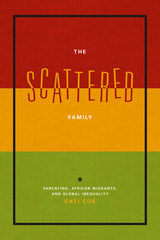
The Scattered Family
Parenting, African Migrants, and Global Inequality
Cati Coe
University of Chicago Press, 2013
Today’s unprecedented migration of people around the globe in search of work has had a widespread and troubling result: the separation of families. In The Scattered Family, Cati Coe offers a sophisticated examination of this phenomenon among Ghanaians living in Ghana and abroad. Challenging oversimplified concepts of globalization as a wholly unchecked force, she details the diverse and creative ways Ghanaian families have adapted long-standing familial practices to a contemporary, global setting.
Drawing on ethnographic and archival research, Coe uncovers a rich and dynamic set of familial concepts, habits, relationships, and expectations—what she calls repertoires—that have developed over time, through previous encounters with global capitalism. Separated immigrant families, she demonstrates, use these repertoires to help themselves navigate immigration law, the lack of child care, and a host of other problems, as well as to help raise children and maintain relationships the best way they know how. Examining this complex interplay between the local and global, Coe ultimately argues for a rethinking of what family itself means.
[more]
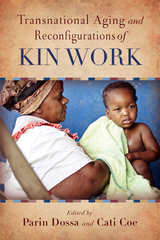
Transnational Aging and Reconfigurations of Kin Work
Dossa, Parin
Rutgers University Press, 2017
Transnational Aging and Reconfigurations of Kin Work documents the social and material contributions of older persons to their families in settings shaped by migration, their everyday lives in domestic and community spaces, and in the context of intergenerational relationships and diasporas. Much of this work is oriented toward supporting, connecting, and maintaining kin members and kin relationships—the work that enables a family to reproduce and regenerate itself across generations and across the globe.
[more]
READERS
Browse our collection.
PUBLISHERS
See BiblioVault's publisher services.
STUDENT SERVICES
Files for college accessibility offices.
UChicago Accessibility Resources
home | accessibility | search | about | contact us
BiblioVault ® 2001 - 2024
The University of Chicago Press









